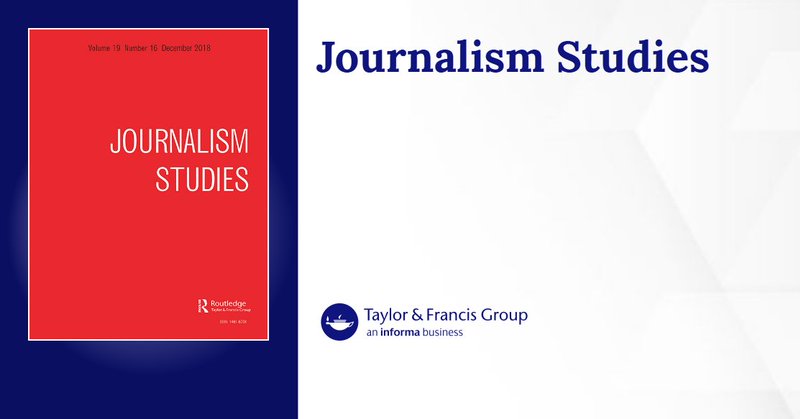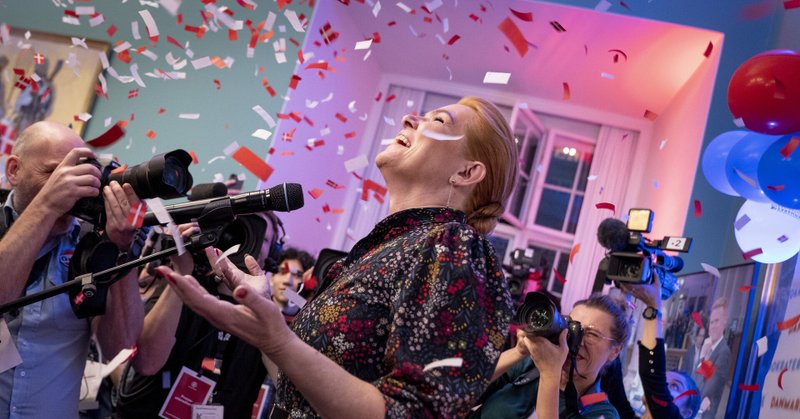
Kim Andersen
@kimandersen88
Followers
752
Following
2K
Media
102
Statuses
443
Last year, @Mo_Skovsgaard and I published an entry on news avoidance distinguishing between consistent, occasional, and selective news avoidance. Following the embargo period, we are now able to share an open-access version of the entry:
New publication on news avoidance! In our entry for the SAGE Encyclopedia of Journalism, @Mo_Skovsgaard and I argue that it is important to distinguish between three different kinds of news avoidance: consistent, occasional, and selective. 1/7
0
3
25
As guest-editors we are very happy with how the special issue turned out and would like to thank all authors for submitting their work, reviewers for critically and constructively engaging with it, and the @journstudies editor @fhanusch for a nice collaboration!.
1
0
3
Lastly, in “How Journalists Perceive News Avoidance” @ruthiepalmer and @StephEdgerly analyze what journalists think could prevent news avoidance, recommending more relevance and positivity + less bias and sensationalism, but overlooking structural causes.
1
2
6
In “I Hope my Partner Will Keep me up-to-date” @hadasgz @tali_aharoni @Netakv and @KerenTenenboim examine how the setting of a spousal relationship impacts practices of news consumption, illustrating how news avoidance is not only an individual behavior.
1
0
3
In “How News Found the Avoiders” @jameswilldennis study young adults’ reactions to covid-19 news, finding that many avoided news from legacy media to protect their mental health and out of frustrations about not seeing their own experiences represented.
1
0
1
In “News Avoidance and Poverty” @ve_synnove and Nærland examine how people living in poverty perceive their own news habits. From the perspective of their informants, limited news consumption is a product of multilevel constraints, rather than a choice.
1
0
1
In “The Dynamics of Political Interest and News Media Avoidance” @erik_espeland shows how very low news use has developed from 1986 to 2021, finding that news avoidance has increased, especially among young people and those with little political interest.
1
0
0
In “The Psychophysiology of News Avoidance” @miacarbonee @s_soroka and @jldhouston question the assumption that phycological activation equals attention and argue that we should use psychophysiological methods to study how emotions drive news avoidance.
1
1
4
In “Feeling Misinformed?” @arielhasell and @anaudreyanne utilize panel survey data collected during the 2020 presidential election in the US to show how feelings of being misinformed increases news avoidance over time.
1
0
0
In “Zooming in on Topics” @SvenjaSchaefer @DBetakova and @solecheler draws on survey data to examine which topics people avoid, and how this selective avoidance is related to issue fatigue, overload, emotional responses, or lack of trust and interest.
1
1
0
In “Who Are They?” @kikidebruin @rensvl @SKruikemeier and @yaeldehaan utilize survey data to identify seven types of news avoiders. While some express dissatisfaction with news, others avoid news for other reasons, such as prioritization of their time.
1
0
0
In “Avoiding News is Hard Work, or is it?” @StephEdgerly interviews people with very low or high news consumption to illustrate how news avoidance can be both easy and difficult. For some, avoiding news is an important way of continuing to consume news.
1
0
0
In the intro @BenjaminToff, @BritaYtreArne and I present a systematic review of existing research and discus what we (don't) know about this multidimensional phenomenon.
1
1
1
The @journstudies special issue “Understanding News Avoidance: Paradoxes, Problems, and Priorities” is finally out: The special issue consists of 10 original research articles and an editorial introduction. Here’s a tread on the content….
tandfonline.com
Understanding News Avoidance: Paradoxes, Problems and Priorities. Volume 25, Issue 12 of Journalism Studies
3
24
80
Looking for a postdoc position and interested in constructive journalism and climate change? @Mo_Skovsgaard I are looking for a talented communication researcher with an interest in experimental research to join our SoJOUR project. Application DL 1 Sep.
fa-eosd-saasfaprod1.fa.ocs.oraclecloud.com
The Centre for Journalism, Department of Political Science and Public Management, University of Southern Denmark, Odense, invites application for one or more full-time postdoctoral fellowships for a...
1
22
27
RT @MK_Brems: Happy to see my article published in Nordicom Review (@Nordicom_GU). In it, I ask the simple question: Who are the users of D….
0
1
0
RT @JoKatrine: Vi søger en nyhedsjournalist til der vil være med til at dække de store dagsordener fra vores newsr….
omtv2.tv2.dk
Her finder du ledige stillinger på TV 2
0
6
0
RT @dmorisi: Job Alert! A PhD and a 3-year postdoc position related to the “DelibRef” project led by me and funded by Carlsberg Foundation….
0
15
0



















